一般将来时的讲解与练习
(完整版)一般将来时态讲解及练习和答案
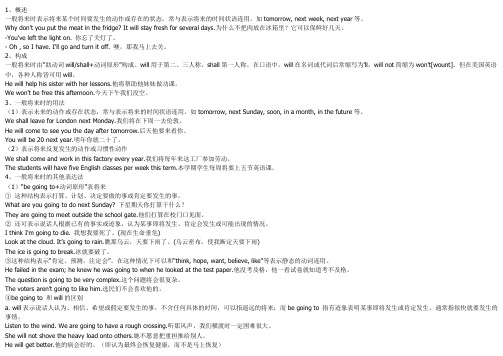
1、概述一般将来时表示将来某个时间要发生的动作或存在的状态,常与表示将来的时间状语连用,如tomorrow, next week, next year等。
Why don’t you put the meat in the fridge? It will stay fresh for several days.为什么不把肉放在冰箱里?它可以保鲜好几天。
-You've left the light on. 你忘了关灯了。
- Oh , so I have. I'll go and turn it off. 噢,那我马上去关。
2、构成一般将来时由“助动词will/shall+动词原形”构成。
will用于第二、三人称,shall第一人称。
在口语中,will在名词或代词后常缩写为'll,will not简缩为won’t[wount]。
但在美国英语中,各种人称皆可用will。
He will help his sister with her lessons.他将帮助他妹妹做功课。
We won't be free this afternoon.今天下午我们没空。
3、一般将来时的用法(1)表示未来的动作或存在状态,常与表示将来的时间状语连用,如tomorrow, next Sunday, soon, in a month, in the future等。
We shall leave for London next Monday.我们将在下周一去伦敦。
He will come to see you the day after tomorrow.后天他要来看你。
You will be 20 next year.明年你就二十了。
(2)表示将来反复发生的动作或习惯性动作We shall come and work in this factory every year.我们将每年来这工厂参加劳动。
六年级英语一般将来时讲解加练习
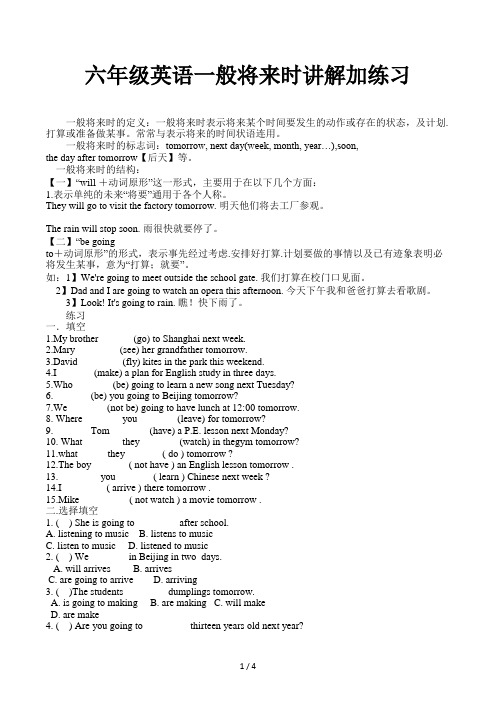
六年级英语一般将来时讲解加练习一般将来时的定义:一般将来时表示将来某个时间要发生的动作或存在的状态,及计划.打算或准备做某事。
常常与表示将来的时间状语连用。
一般将来时的标志词:tomorrow, next day(week, month, year…),soon,the day after tomorrow【后天】等。
一般将来时的结构:【一】“will +动词原形”这一形式,主要用于在以下几个方面:1.表示单纯的未来“将要”通用于各个人称。
They will go to visit the factory tomorrow. 明天他们将去工厂参观。
The rain will stop soon. 雨很快就要停了。
【二】“be goingto+动词原形”的形式,表示事先经过考虑.安排好打算.计划要做的事情以及已有迹象表明必将发生某事,意为“打算;就要”。
如:1】We're going to meet outside the school gate. 我们打算在校门口见面。
2】Dad and I are going to watch an opera this afternoon. 今天下午我和爸爸打算去看歌剧。
3】Look! It's going to rain. 瞧!快下雨了。
练习一.填空1.My brother ______ (go) to Shanghai next week.2.Mary ________ (see) her grandfather tomorrow.3.David ________ (fly) kites in the park this weekend.4.I_______ (make) a plan for English study in three days.5.Who _______ (be) going to learn a new song next Tuesday?6._______ (be) you going to Beijing tomorrow?7.We _______ (not be) going to have lunch at 12:00 tomorrow.8. Where _______ you _______ (leave) for tomorrow?9._______ Tom _______ (have) a P.E. lesson next Monday?10. What _______ they _______ (watch) in thegym tomorrow?11.what _____ they _______( do ) tomorrow ?12.The boy _______( not have ) an English lesson tomorrow .13.________ you _______( learn ) Chinese next week ?14.I ________ ( arrive ) there tomorrow .15.Mike _________ ( not watch ) a movie tomorrow .二.选择填空1. ( ) She is going to ________ after school.A. listening to musicB. listens to musicC. listen to musicD. listened to music2. ( ) We _______ in Beijing in two days.A. will arrivesB. arrivesC. are going to arriveD. arriving3. ( )The students ________ dumplings tomorrow.A. is going to makingB. are makingC. will makeD. are make4. ( ) Are you going to_________ thirteen years old next year?A. will beB. areC. beD. go5. ( ) ___will see a play in 5 days?A. WhenB. WhatC. WhoD. Whose6. ( ) Mary______ English next year.A. will learnB. will to learnC. are going to learn.D. learns7. ( ) He’ll _____ shopping this afternoon.A. goingB. goC. goesD. went8. ( ) Will you ____ at the bus stop at 10:30?A. meetingB. meetsC. meetD. met9. ( ) Lily and I _______ the guitar. next week.A. am going to playB. are going to playC. will playsD. play10. ( ) How ______ Jenny ___ home tomorrow?A. does......goB. is……goingC. will……goD. do……g o11. ( ) Who is going to _________ a song ?A. sings B singing C. to sing D. sing12. ( ) I _________in Beijing in three days.A. are going to arriveB. arriveC. will arriveD. arrives13. ( ) He _______some model planes tomorrow .A. going to makeB. is makingC. will make D makes14. ( ) Are you going to ___________a doctor next year ?A. will beB.. areC. beD. are going to15. ( ) She ________ you make supper this evening .A. helpsB. will helpC. is helpingD. is going help三.把下列句子变成一般疑问句,并给出肯定和否定回答。
一般将来时讲解及练习(含答案)
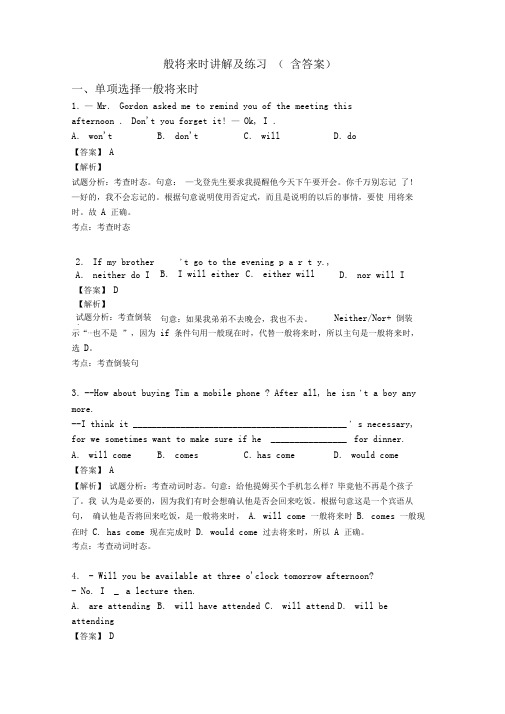
般将来时讲解及练习(含答案)一、单项选择一般将来时1.—Mr.Gordon asked me to remind you of the meeting thisafternoon .Don't you forget it! —Ok, I .A.won't B.don't C.will D.do【答案】A【解析】试题分析:考查时态。
句意:—戈登先生要求我提醒他今天下午要开会。
你千万别忘记了!—好的,我不会忘记的。
根据句意说明使用否定式,而且是说明的以后的事情,要使用将来时。
故A 正确。
考点:考查时态2.If my brother doesn 't go to the evening p a r t y.,A.neither do I B.I will either C.either willI D.nor will I【答案】D 【解析】试题分析:考查倒装句:句意:如果我弟弟不去晚会,我也不去。
Neither/Nor+ 倒装句,表示“⋯也不是”,因为if 条件句用一般现在时,代替一般将来时,所以主句是一般将来时,选D。
考点:考查倒装句3.--How about buying Tim a mobile phone ? After all, he isn 't a boy any more.--I think it _____________________________________________ ' s necessary, for we sometimes want to make sure if he ________________ for dinner. A.will come B.comes C.has come D.would come【答案】A【解析】试题分析:考查动词时态。
句意:给他提姆买个手机怎么样?毕竟他不再是个孩子了。
我认为是必要的,因为我们有时会想确认他是否会回来吃饭。
一般将来时讲解和练习
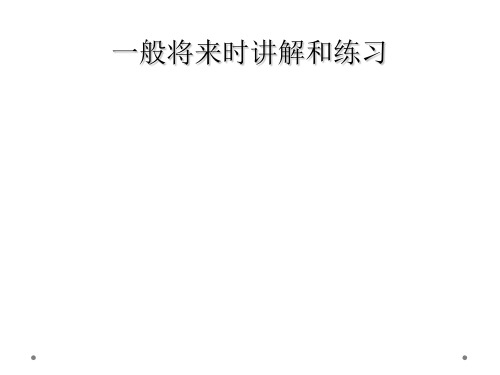
Functional Practise:
汉译英: 1.明天,我们学校将有场足球赛,我准备去看. 2.我打算和李明一起复习功课. 3.将来每个人都有一台计算机. 4.美美正在做饭.今天晚上她要把饭带到晚会上去. 5.我理想的学校将有宽大的教室和图书室. 6.学生将在电脑上与老师对话. 7.将来有学校吗?不,没有 8.我们将使用因特网在家里学习.
7. Many girls likkee_ep_i_n_g__ a pet. 8. There will be a sports meeting tomorrow.(一般疑问句)
9. Will__t_he_r_e_b_e__ a sports meeting tomorrow 10.我想将会有更多高楼,更少汽车,更少污染。
A.must B.will
C.would
D.is going to
注意:will与be going to的区别,be going to可以表示明显将要发生的情况.
3.There_B _ a basketball match this afternoon.
A.will have B.will be
C.has
注意:在口语中,所有人称都可以用will.
Be + going + to
一定句 :主语 + be ( am, is, are ) + going to + 动词原形 eg. I’m going to go there next month. 下个月我将去那里。
He is going to visit his grandparents next year. 明年他将要去看望他的爷 They are going to find a new house to live in. 他们将要找一所新房子住。 否定句 : 主语 + be ( am, is, are ) + not + going to + 动词原形 eg. He isn’t going to see the movie. 他不会去看电影。 You aren’t going to work on the farm this weekend. 这个周末你们不去家 We aren’t going to have a meeting this afternoon. 今天下午我们不开会。 疑问句 Be ( am, is, are ) + 主语 + going to + 动词原形 eg. Are you going to have a party tomorrow 明天你们要开联欢会吗? Is he going to write to his friends 他要给他的朋友写信吗? Are they going to buy a new car 他们要买一辆新车吗? 特殊疑问句 特殊疑问词 + be ( am, is, are ) + 主语 + going to + 动词原形 eg. What are you going to have tomorrow 明天你们要吃什么? What are you going to do tonight I’m going to watch the baseball gam 今晚你打算做什么?我想要看棒球赛。
初中英语主要时态系列——一般将来时讲解及练习【附中考真题及解析】
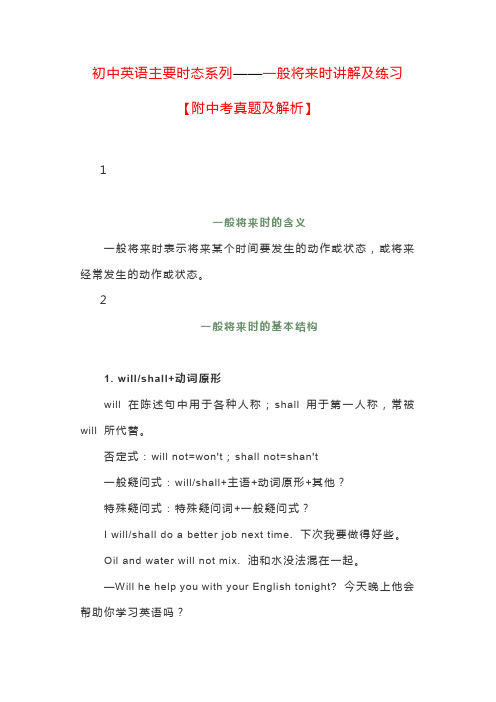
初中英语主要时态系列——一般将来时讲解及练习【附中考真题及解析】1一般将来时的含义一般将来时表示将来某个时间要发生的动作或状态,或将来经常发生的动作或状态。
2一般将来时的基本结构1. will/shall+动词原形will 在陈述句中用于各种人称;shall用于第一人称,常被will 所代替。
否定式:will not=won't;shall not=shan't一般疑问式:will/shall+主语+动词原形+其他?特殊疑问式:特殊疑问词+一般疑问式?I will/shall do a better job next time. 下次我要做得好些。
Oil and water will not mix. 油和水没法混在一起。
—Will he help you with your English tonight? 今天晚上他会帮助你学习英语吗?—Yes, he will./No, he won't. 是的,他会。
/不,他不会。
—When will you arrive for America? 你什么时候去美国?—Tomorrow. 明天。
2. am/is/are going to +动词原形否定式:am/is/are not going to +动词原形一般疑问式:am/is/are +主语+ going to + 动词原形+其他?特殊疑问式:特殊疑问词+一般疑问式?He is going to spend his holidays in London. 他打算在伦敦度假。
Look at the dark clouds. There is going to be a storm. 看那乌云,快要下雨了。
Is he going to collect any data for us? 他会帮我们收集数据吗?What are you going to do tomorrow? 明天你打算作什么?3一般将来时的用法will+动词原形与am/is/are going to +动词原形的用法虽然都表示将来发生动作或情况,一般情况下能互换。
一般将来时入门详解与练习

一般将来时入门详解与练习只有在正确方向上的积累才更有效率,更容易取得成果,小偏整理了一般将来时入门详解与练习,欢迎参考借鉴。
一般将来时入门详解与练习一、定义:表示将要发生的动作或存在的状态及打算、计划或准备做某事。
二、基本构成:①be going to + do.打算做某事:eg:I’m going to be a singer.我打算成为一名歌手。
She is going to learn French.她打算去学习法语。
②will / shall + 动词原形这种方法一般单纯地表示将来某个时间将要发生的动作或存在的状态。
will用于各种人称;shall只用于第一人称。
eg:I will / shall go to visit him next week.下周我将去拜访他。
What time shall we go there tomorrow? 明天我们几点去那儿?注:will 常简略为'll,并与主语连写在一起,如:I'll,he'll,it'll,we'll,you'll,they'll。
③否定句:在be动词(am, is, are)l后加not或情态动词will后加not成won’t。
例如:I’m going to have a picnic this afternoon.→ I’m not going to have a picnic this afternoon.④一般疑问句:be或will提到句首,some改为any, and改为or,第一二人称互换。
例如:We are going to go on an outing this weekend.→ Are you going to go on an outing this weekend?⑤对划线部分提问:一般情况,一般将来时的对划线部分有三种情况。
1、问人。
Who例如:I’m going to New York soon. →Who’s going to New York soon.2、问干什么。
小学英语一般将来时讲解与练习
小学英语一般将来时讲解与练习一般将来时:一、概念:表示将要发生的动作及打算、计划或准备做某事。
句中一般有以下时间状语:tomorrow, next day(week, month, year…),soon, the day after tomorrow(后天)等。
二、基本结构:①主语+be going to + 动词原形+其他;②主语+will+动词原形+其他三、否定句:在be动词(am, is, are)后加not或情态动词will 后加not成won't。
例如:I'm going to have a picnic this afternoon.→ I'm not going to have a picnic this afternoon.四、一般疑问句: be或will提到句首,some改为any, and改为or,第一二人称互换。
例如:We are going to go fishing this weekend. → Are you going to go fishing this weekend?五、对划线部分提问。
一般情况,一般将来时的对划线部分有三种情况。
1. 问人。
Who例如:I'm going to New York soon. →Who's going to New York soon?2. 问干什么。
What … do.例如: My father is going to watch a race with me this afternoon. →What is your father going to do with you this afternoon?3. 问什么时候。
When.例如:She's going to go to bed at nine. →When is she going to bed?六、同义句:be going to = willI am going to go swimming tomorrow(明天). = I will go swimming tomorrow.填空。
(完整版)小学英语一般将来时讲解及练习
小学英语一般将来时讲解及练习一、一般将来时的定义:一般将来时表示在将来时间将要发生的动作或存在的状态,与表示将来的时间连用。
tomorrow, next day(week, month, year…),soon, the day after tomorrow(后天)等。
如:She will visit Shanghai tomorrow.二、一般将来时的构成1.一般将来时有两种构成形式:(1)主语+shall/will+do(2)主语+ be going to + do 在表示“打算到某地去时”由于谓语动词go与going重复,一般可以只说be going to a place。
三、一般将来时的用法1.(1)主语+shall/will+do (will可用于所有人称,shall只用于第一人称I和we) 这种结构不是表示自己的打算、意图或计划,而是表示未来的事实或对将来的预测等如:No one will do heavy work.Roberts will do everything for us.(2)主语+ be going to + do这种结构常用来表达自己打算做某事、计划做某事或者有意做某事。
注意:be 动词要与主语的人称和数一致,如:I am going to do some reading tomorrow.He is going to have a piano lesson next week.We are going to have a party this Friday.2.通常情况下will 和 be going to能互换,但是be going to 与will用法的也是有点区别的(1)只用will不用be going to的情况:①表示对未来时间与年龄的推测时,如:Tomorrow will be Monday.She will be thirteen next year.②表示必然发生时,如:Fish will die without water.People will die if all green plants die.(2)只用be going to而不用will的情况:如果表示已有迹象表明在不久的将来要发生的事情时,如:Look at those black clouds, It’s going to rain.3.某些动词如:go/come/leave/start/begin/arrive等,它们的现在进行时可以表示将来时,如:They are leaving for Shanghaitomorrow.My brother is coming here soon.四、一般将来时的句式变换肯定句:主语+shall/will+do主语+ be going to + do否定句:主语+shall/will+not+do(will not 可缩写成won’t)主语+ be+ not+ going to +do一般疑问句:shall/will+主语+ dobe+主语+going to+do特殊疑问句:疑问词+ shall/will+主语+do疑问词+be+主语+going to+do一般将来时练习题:一、用单词的适当形式填空。
一般将来时讲解(附习题+答案)
一般将来时讲解(附习题+答案)一、一般将来时的含义:表示动作发生在将来二、一般将来时的句型:(1) will/shall+动词原形(2) be going to+动词原形三、一般将来时的时间状语:tomorrow(明天)、the day after tomorrow(后天)、next...(下一...): next week(下一周)、next year(明年)、next month(下个月)in+一段时间(...之后): in three days(三天之后)、in the future在未来this evening(今天晚上)四、一般将来时的句型结构:(1) will/shall+动词原形(will not =won’t)(will 各种人称均可用,shall 只能用于第一人称)1)肯定句:主语+will/shall+动词原型...如:I will go to school tomorrow.我明天将会去学校He will go to school tomorrow.他明天将会去学校。
2)否定句:主语+will/shall+not+动词原型...如:I won’t go to school tomorrow.我明天将不会去学校。
He won’t go to school tomorrow.他明天将不会去学校。
3)一般疑问句:Will/Shall +主语+动词原型...如:Will you go to school tomorrow?你明天要去学校吗?Will he go to school tomorrow?他明天要去学校吗?肯定回答:Yes, 主语+will.如:Yes, I will.Yes, he will.否定回答:No,主语+will+not.如:No, I won’t.No, he won’t.4) 特殊疑问句:特殊疑问词+will/shall+主语+动词原型...如:What will you do tomorrow?你明天将会做什么?What will he do tomorrow?他明天将会做什么?(2) be going to+动词原形1)肯定句:主语+be going to +动词原型...如:I am going to buy some books tomorrow.我明天打算去买一些书。
一般将来时的讲解与练习.docx
一般将来时的讲解与练习Ⅰ概念:⒈表示将来某个要生的作或存在的状,⒉也表示将来常或反复生的作,常与表示将来的状用。
例如:tomorrow , tomorrow morning /afternoon ⋯,the day after tomorrow , next year , next month⋯, from nowon ( 从在开始 ) ,in an hour ( 一小后 ) ,in two days / weeks ,soon, in the future ⋯等。
如: He is going to be a doctor in the future.(将存在的状)I am going to make a card by myself tomorrow.(将生的作)They will work from Monday to Friday next week.(将常反复生的作)Ⅱ谓语结构:1. 肯定句:主+ will/be going to +原形+其他。
注: will和be going to的区:⑴ be going to 表示近期、眼下就要生的事情;will 表示的将来一些。
如: He is going to write a letter tonight.He will write a book one day.⑵ be going to表示根据主判断将来肯定生的事情,will 表示客上将来必生的事情。
如:He is seriously ill. He is going to die.He will be twenty years old.⑶ be going to含有“ 划,准”的意思,而will没有个意思。
如:She is going to lend us her book.He will be here in half an hour.⑷ .在有条件从句的主句中,一般不用be going to,而多用will。
- 1、下载文档前请自行甄别文档内容的完整性,平台不提供额外的编辑、内容补充、找答案等附加服务。
- 2、"仅部分预览"的文档,不可在线预览部分如存在完整性等问题,可反馈申请退款(可完整预览的文档不适用该条件!)。
- 3、如文档侵犯您的权益,请联系客服反馈,我们会尽快为您处理(人工客服工作时间:9:00-18:30)。
一般将来时的讲解与练习Ⅰ概念:⒈表示将来某个时间要发生的动作或存在的状态,⒉也表示将来经常或反复发生的动作,常与表示将来的时间状语连用。
例如:tomorrow , tomorrow morning / afternoon …,the day after tomorrow , next year , next month … , from now on (从现在开始),in an hour (一小时后),in two days / weeks ,soon, in the future…等。
如:He is going to be a doctor in the future.(将存在的状态)I am going to make a card by myself tomorrow.(将发生的动作)They will work from Monday to Friday next week.(将经常反复发生的动作)Ⅱ谓语结构:1.肯定句:主语 + will/be going to + 动词原形 + 其他。
注:will和be going to 的区别:⑴be going to表示近期、眼下就要发生的事情;will表示的将来时间则较远一些。
如:He is going to write a letter tonight.He will write a book one day.⑵be going to 表示根据主观判断将来肯定发生的事情,will表示客观上将来势必发生的事情。
如:He is seriously ill. He is going to die.He will be twenty years old.⑶be going to 含有“计划,准备”的意思,而will 则没有这个意思。
如:She is going to lend us her book.He will be here in half an hour.⑷.在有条件从句的主句中,一般不用be going to, 而多用will。
如:If any beasts comes at you, I'll stay with you and help you.⑸.问对方是否愿意,或表示客气的邀请或命令时,常用Will you (please)…?如: Will you please stop smoking?2.否定句:a.主语 + will + not(won’t)+ 动词原形 + 其他。
b.主语 + be + not + going to + 动词原形 + 其他。
如:We won’t go there by bike.They aren’t going to meet at school gate.3.一般疑问句: a.Will + 主语 + 动词原形 + 其他?b.Be + 主语 + going to + 动词原形 + 其他?如:His father will agree with him.→Will his father agree with him?---Yes,he will/No,he won’t.The president is going to visit the small town. →Is the president going to visit the small town?--- Yes, he is./No, he isn’t.4.特殊疑问句:特殊疑问词 + 一般疑问句?如:What are you doing next weekend?What will be the weather like tomorrow?注意:1)在疑问句中,主语为第一人称I或we时,助动词用shall;如:shall we go?What shall I do next?2)书面语中,主语为I或we时,常用shall+动词原词,但在口语中,无论肯定句和否定句,所有人都可以用will.如; We shall be very pleased to see you.3)shall we ……? 还可作为征求或建议对方意见时的用语。
如; Shall we have a rest?Shall we go at ten in the morning?练习Ⅰ按括号内的提示,改写句子:1、There are two cinemas in that town. (next year)2、He comes back late. (in two days)3、Li Ming is ten years old. (next year)4、China is a modern and strong country. (in twenty years)5、Do you study hard? (from now on)Ⅱ选择题( )1. There __________ a meeting tomorrow afternoon.A. will be going toB. will going to beC. is going to beD. will go to be( )2. Charlie ________ here next month.A. isn’t workingB. doesn’t workingC. isn’t going to wor kingD. won’t work( ) 3. He ________ very busy this week, he ________ free next week.A. will be; isB. is; isC. will be; will beD. is; will be( ) 4. There ________ a dolphin show in the zoo tomorrow evening.A. wasB. is going to haveC. will haveD. is going to be( ) 5. –________ you ________ free tomorrow?– No. I ________ free the day after tomorrow.A. Are; going to; willB. Are; going to be; willC. Are; going to; will beD. Are; going to be; will be( ) 6. Mother ________ me a nice present on my next birthday.A. will givesB. will giveC. givesD. give( )7 – Where is the morning paper?– I ________ it for you at once.A. getB. am gettingC. to getD. will get( )8. ________ a concert next Saturday?A. There will beB. Will there beC. There can beD. There are( )9. He ________ her a beautiful hat on her next birthday.A. givesB. gaveC. will givingD. is going to give( ) 10. He ________ to us as soon as he gets there.A. writesB. has writtenC. will write( ) 11. He ________ in three days.A. coming backB. came backC. will come backD. is going to coming back( ) 12. If it ___tomorrow, we’ll go roller-skating.A. isn’t rainB. won’t rainC. doesn’t rainD. doesn’t fine( ) 13. It ________ the year of the horse next year.A. is going to beB. is going toC. will beD. will is( ) 14. ________ open the window?A. Will you pleaseB. Please will youC. You pleaseD. Do you( )15. –Let’s go out to play football, shall we?– OK. I ________.A. will comingB. be going to comeC. comeD. am coming( ) 16. It ________ us a long time to learn English well.A. takesB. will takeC. spendsD. will spendⅢ填空1. 我打算明天和朋友去野炊。
I_____ _______ _________ have a picnic with my friends.I ________ have a picnic with my friends.2. 下个星期一你打算去干嘛? 我想去打篮球。
What ________ ________ _________ _________ _________ next Monday? I _______ ______ _____ play basketball.What _________ you do next Monday? I ________ play basketball.3. 你妈妈这个周末去购物吗?是,她要去买一些水果。
_____ your mother _______ ________ go shopping this ___________?Yes, she _________. She ______ ________ __________ buy some fruit.Ⅳ句型转换1. Nancy is going to go camping.(改否定)Nancy ________ going to go camping.2. I’ll go and join them.(改否定)I _______ go ______ join them.3. I’m going to get up at 6:30 tomorrow.(改一般疑问句)________ _______ ________ to get up at 6:30 tomorrow?4. We will meet at the bus stop at 10:30.(改一般疑问句)_______ ________ meet at the bus stop at 10:30?现在进行时态讲解及练习题Ⅰ概念现在进行时表示1、现在(说话瞬间)正在进行或发生的动作,强调“此时此刻”常与now, lisen, look等词连用。
